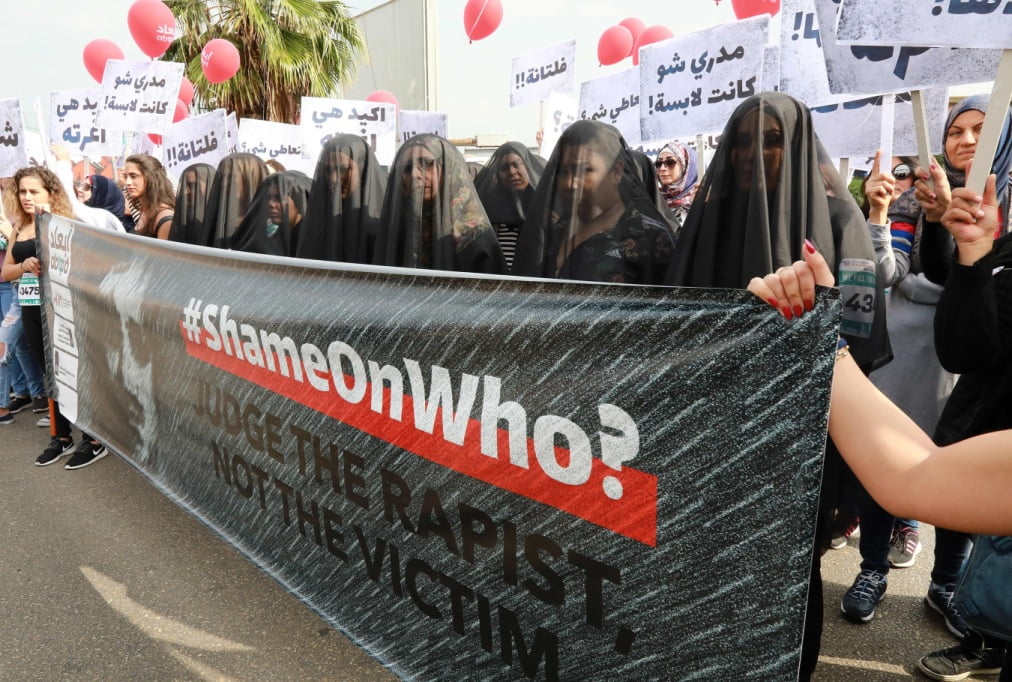
Dozens of incidents of sexual violence have been reported in Lebanon over the past few months. However, this number represents the tip of the iceberg, as most attacks remain secret due to a conducive environment supporting perpetrators and a culture of reluctance towards victims.
By Zeina Allouche (PhD)
A 14-year-old girl was sexually assaulted in an abandoned apartment in the Sabra area. A woman lured her to this apartment, where she beat and tortured her, then left her as prey for a man who brutally raped her. All this appeared in a video recorded by another man, who was in on the crime for blackmail.
The video was camouflaged to prevent anyone from directly identifying the victim. Still, it made it possible to identify the criminals and then arrest this group of villains, according to a statement issued by the General Directorate of Internal Security Forces’ Public Relations Division.
The girl’s mother filed a complaint against unknown persons for the crimes of beating, violence, and sexual assault against her minor daughter “after the assailants posted video clips showing this on the victim’s social media pages.”
A horrible crime has captured public opinion after a series of outrageous attacks against children and women in Lebanon, opening the door to many ethical questions. Perhaps the first of these questions relates to our environment that incubates unending sexual violence.
How does the circulation of a video showing the rape of a minor (which is, in itself, a violation, even though the child’s face is hidden) become a justice motive?
What if the assault had not been documented? Will the child’s family and the judiciary believe the victim? Why was the teen brutally beaten before being raped? What is the relationship between physical and sexual violence?
Does documenting the crime for blackmailing purposes fuel the culture of voyeurism and the violation and arousal it causes, which can lead to sexual violence?
Would the crime and its documentation for the purpose of blackmail have been possible without an overpowering public environment that tends to blame the victim and consider her a source of shame for the family?
A 2016 study titled “Varieties of Intrusion: Exhibitionism and Voyeurism” indicates a relationship between voyeurism and objectification, which requires transforming the victim into a being without a soul or feelings and, most importantly, a being without dignity.
The nature of voyeurism is based on the implicit violence that results from watching someone being violated without their knowledge or consent, that is, turning them into an “object” by taking away their right to support or self-control.
The study revealed that many criminals who commit sexual assaults are addicted to voyeurism or are aroused by the addiction of watching films of sexual violence that include serious scenes of beatings, rape, and torture.
This then posits a critical question: Doesn’t the distribution of these recordings, without criminalising those who publish and distribute them, feed the imagination of those capable of committing the crime?
Dozens of incidents of sexual violence have been reported in Lebanon in recent months. Still, this number represents the tip of the iceberg, as most attacks remain secret due to an incubating environment supporting the criminal under flimsy justifications.
The first line of defence is blaming the victim, an expected behaviour that negatively reinforces sexual violence. How often have victims of sexual violence been confronted with questions like, “What did you do to encourage that violence? What were you wearing? Why were you walking alone? Why were you out so late at night? Who told you to go there in the first place?”
In this way, the public often, unknowingly or perhaps knowingly, shifts responsibility to the survivors, implicitly suggesting that they invited the violence through their actions, clothing, or choices. We see many people slip into questions like these that circulate on social media, putting additional pressure on victims to refrain from reporting out of fear of this hidden suspicion.
In environments without accountability, rape jokes become problematic because they are an offensive practice that contributes to normalizing violence. It turns the crime into a joke without protective measures for the victims whose pain is not taken seriously.
The absence of a system of accountability transforms a severe issue into a trivial matter that generates frightening yellow laughter. This reinforces creating a hostile environment for survivors who do not find the space to condemn their aggressors, which is also a significant obstacle to reporting the crime and the process of transition to healing.
Abuse of power is when the most dominant, influential, or famous person justifies assault or sexually abusive behaviour. This sends a clear message that anyone with passion, in all its forms and degrees, can practice sexual violence with impunity.
Our recent and distant history in Lebanon bears witness to such practices, not the least of which is covering up for aggressors or refraining from bringing them to justice, as in the case of Mansour Labaki and many others.
Normalising the exchange of criminal videos and not condemning those who watch and exchange these videos, especially those of children, as in the United States and Europe, normalises their dissemination and transforms them into part of the permitted pornographic and news consumption that goes beyond curiosity to the approval of a violent imagination of sexual activity.
A survivor of sexual violence told me that her husband has an addiction to watching movies based on unreasonable sexual violence. Although she knew this addiction would one day affect her, she remained silent until her husband assaulted her.
The survivor conveyed that when she told her mother about the problem, she received the response, “Before you blame your husband, see where you are neglecting your marital duties. It’s okay for men to be watching such videos, but what did you do that made him hit you?
It can be said without hesitation that our environment is an incubator for sexual violence in its various forms and degrees. In every corner, there is an “aggressor” waiting for the opportunity to attack their “prey.” In the meantime, our most vulnerable children are victims of the nonchalant public discourse that embraces the criminal and undermines the victim.
This article was published by Daraj an independent media platform where Arabic speakers are offered an alternative kind of journalism, free from political funding and influence, which controls other mainstream Arab media institutions.





